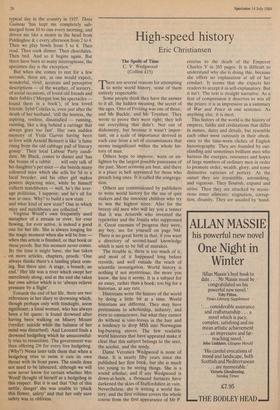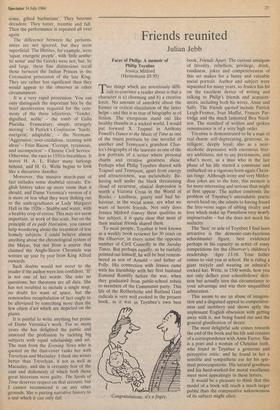High-speed history
Eric Christiansen
The Spoils of Time C. V. Wedgwood (Collins £15)
rr here are several reasons for attempting 1 to write world history, none of them entirely respectable.
Some people think they have the answer to it all, the hidden meaning, the secret of the ages. Otto of Freising was one of those, and Mr Buckle, and Mr Toynbee. They wrote to prove they were right; they left out everything that didn't. Not out of dishonesty, but because it wasn't impor- tant, on a scale of importance derived in each case from a set of circumstances that seems insignificant within the whole his- tory of man.
Others hope to improve, warn or en- lighten by the largest possible panorama of the past. Short sermons are best, and there is a place in hell appointed for those who preach long ones. It is called the congrega- tion.
Others arc commissioned by publishers to write world history for the use of quiz makers and the innocent children who try to win the highest score. Also for the breezy old men who will lay you a tenner that it was Aristotle who invented the typewriter and the Jesuits who suppressed it. Great enemies of progress they were, my boy, see for yourself on page 944. There is no great harm in that, if you want a directory of second-hand knowledge which is sure to be full of mistakes.
The trouble is, there is too much of it, and most of it happened long before records, and well outside the reach of scientific investigation. World history is nothing if not mysterious; the more you know, the less it seems. It is a subject for an essay, rather than a book; too big for a historian, at any rate.
Historians write the history of the world by doing a little bit at a time. World historians are different. They may have pretensions to scholarship, industry, and even to omniscience, but what they cannot do without is vine-leaves in the hair and a tendency to drop MSS into Norwegian log-burning stoves. The few readable world histories that have appeared make it clear that this subject belongs to the seer, the sciolist, and the seedy.
Dame Veronica Wedgwood is none of these. It is nearly fifty years since she published her first book, but she is much too young to be seeing things. She is a sound scholar; and if any Wedgwood is down-at-heels, a thousand furnaces have darkened the skies of Staffordshire in vain. Nevertheless, she is writing a world his- tory, and the first volume covers the whole course from the first appearance of Mr P. erectus to the death of the Emperor Charles V in 265 pages. It is difficult to understand why she is doing this, because she offers no explanation at all of her conduct. It seems that she expects her readers to accept it as self-explanatory. But it isn't. The text is straight narrative. As a feat of compression it deserves to win all the prizes: it is as impressive as a summary of War and Peace in one sentence. As anything else, it is inert.
This history of the world is the history of empires, faiths and civilizations that differ in names, dates and details, but resemble each other most curiously in their obedi- ence to the time-worn clichés of English historiography. They are founded by out- standing and sometimes brilliant men who harness the energies, resources and hopes of large numbers of ordinary men in order to promote order, wealth, glory, and some distinctive varieties of pottery. At the outset they are irresistible, astonishing, and vigorous. They flourish, expand and strive. Then they are attacked by myste- rious inner ailments: stagnation, corrup- tion, disunity. They are assailed by 'hand- some, gifted barbarians'. They become decadent. They totter, tremble and fall. Then the performance is repeated all over again.
The difference between the perform- ances are not ignored, but they seem superficial. The Hittites, for example, were `squat, energetic people', with 'little aesthe- tic sense' and the Greeks were not; but, by and large, these fine distinctions recall those between the Indian Princes in the Coronation procession of the late King. They are rather less significant than they would appear to the observer in other circumstances.
It is a very rapid procession. You can only distinguish the important bits by the brief deceleration required for the cere- mony of the three adjectives. 'Tender, dignified, noble' — the tomb of Galla Placidia. 'Framentary, simple, strangely moving' — St Patrick's Confession. 'hardy, energetic, adaptable', — the Normans. 'Aggressive, over-credulous, teeming with ideas' — Friar Bacon. 'Corrupt, tyrannous, and incompetent' — Chinese Civil Service. Otherwise, the race to 1550 is breathless. It leaves H. A. L. Fisher many furlongs behind, and H. G. Wells begins to look like a discursive dawdler.
Moreover, this massive march-past of fact includes some doubtful recruits. En- glish history takes up more room than it should, and Dame Veronica's version of it is more or less what they were dishing out to the undergraduates at Lady Margaret Hall in the 1920s — Stubbs and water, with a healthy crop of errors. This may not seem important, in work of this scale, but on the principle of ex pede Herculem, you cannot help wondering about the treatment of less homely subjects. I could believe almost anything about the chronological system of the Mayas, but not from a source that claimed the Anglo-Saxon Chronicle was written up year by year from King Alfred onwards.
Such doubts would not occur to the reader if the author were less confident. 'If' is not one of her words. She asks no questions; her theorems are all data. She has not troubled to include a single map, no doubt for want of space, but the remorseless recapitulation of fact ought to be alleviated by something more than the few objets d'art which are depicted on the plates.
It is painful to write anything but praise of Dame Veronica's work. For so many years she has delighted the public and annoyed the profession by tackling big subjects with equal scholarship and art. The man from the Evening News who is quoted on the dust-cover ranks her with Trevelyan and Macaulay. I think she writes better than Trevelyan, if not as well as Macaulay, and she is certainly free of the cant and dishonesty of which both those great historians were guilty. The Spoils of Time deserves respect on that account; but I cannot recommend it on any other grounds. She is putting narrative history to a test which it can only fail.















































 Previous page
Previous page